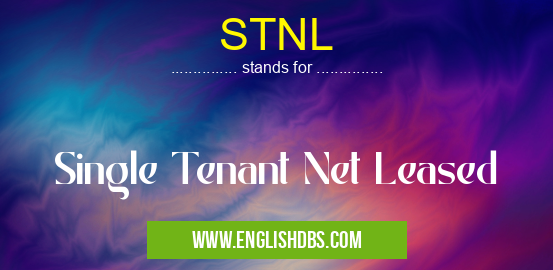What does STNL mean in UNCLASSIFIED
In the world of commercial real estate, there are numerous acronyms and abbreviations used to describe different property types and lease structures. One common abbreviation is STNL, which stands for Single Tenant Net Leased. Understanding the meaning and implications of STNL is crucial for investors, landlords, and tenants involved in commercial real estate transactions.

STNL meaning in Unclassified in Miscellaneous
STNL mostly used in an acronym Unclassified in Category Miscellaneous that means Single Tenant Net Leased
Shorthand: STNL,
Full Form: Single Tenant Net Leased
For more information of "Single Tenant Net Leased", see the section below.
What does STNL Stand for?
STNL refers to a type of commercial lease agreement where the tenant is solely responsible for all operating expenses associated with the property, including property taxes, insurance, repairs, and maintenance. Unlike other lease structures where the landlord typically assumes some of these expenses, in a STNL arrangement, the tenant bears the entire financial burden.
Key Characteristics of STNL
- Single Tenant: The property is occupied by only one tenant.
- Net Lease: The tenant is responsible for all operating expenses.
- Long-Term Lease: STNL leases are typically long-term, often lasting for 10 to 25 years or more.
- Creditworthy Tenant: Landlords typically prefer tenants with strong credit ratings and financial stability.
- Limited Landlord Involvement: The landlord's involvement is primarily limited to collecting rent and ensuring the tenant meets its obligations under the lease.
Advantages of STNL
- Stable Income for Landlords: STNL provides a predictable and reliable income stream for landlords, as expenses are the tenant's responsibility.
- Reduced Risk for Landlords: Landlords have minimal involvement in the property's operations, reducing their risk of property damage or maintenance issues.
- Attractive Returns for Investors: STNL properties can offer attractive returns for investors due to the long-term nature of the lease and the lack of landlord expenses.
Disadvantages of STNL
- Higher Operating Costs for Tenants: Tenants must factor in the additional expenses associated with operating the property, which can impact their profitability.
- Limited Flexibility: STNL leases are typically long-term, which can limit the tenant's ability to expand or relocate.
- Potential for Unexpected Expenses: Even though the tenant is responsible for operating expenses, extraordinary repairs or unforeseen circumstances can lead to unexpected costs.
Essential Questions and Answers on Single Tenant Net Leased in "MISCELLANEOUS»UNFILED"
What is Single Tenant Net Leased (STNL)?
Single Tenant Net Leased (STNL) is a commercial real estate investment strategy where an investor purchases a property that is leased to a single tenant for a long-term period. The tenant is responsible for all operating expenses, including property taxes, insurance, maintenance, and repairs.
What are the benefits of investing in STNL properties?
STNL properties offer investors several advantages, including:
- Stable and predictable income: The long-term lease agreement provides investors with a steady stream of rental income.
- Low operating expenses: Since the tenant is responsible for all operating expenses, investors have minimal out-of-pocket costs.
- Appreciation potential: The value of STNL properties can appreciate over time, providing investors with capital gains.
What are the risks of investing in STNL properties?
While STNL properties offer many benefits, there are also some risks to consider:
- Tenant default: If the tenant defaults on their lease, investors may lose their rental income and face foreclosure.
- Changes in market conditions: Economic downturns or changes in the local real estate market can affect the value of STNL properties.
- High upfront investment: STNL properties often require a large upfront investment, which can make them inaccessible to some investors.
Who should consider investing in STNL properties?
STNL properties are suitable for investors who seek:
- Passive income: Investors who want a hands-off investment with stable rental income.
- Long-term growth: Investors who are willing to hold properties for extended periods to benefit from potential appreciation.
- Low-maintenance investments: Investors who prefer properties with minimal operating expenses.
Final Words: Understanding the meaning and implications of STNL is essential for anyone involved in commercial real estate. STNL leases offer certain benefits, such as stable income for landlords and reduced risk, but they also come with potential drawbacks for tenants, including higher operating costs and limited flexibility. By carefully considering the advantages and disadvantages, investors, landlords, and tenants can make informed decisions that align with their specific requirements.
